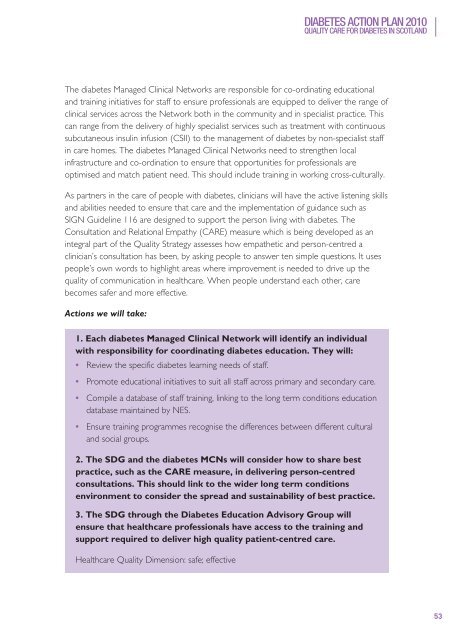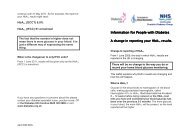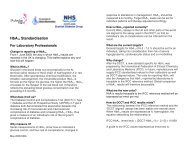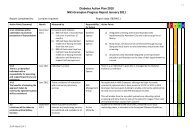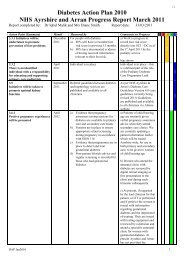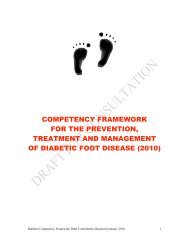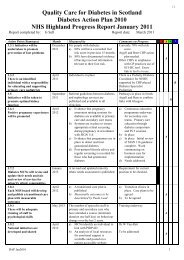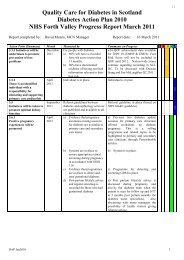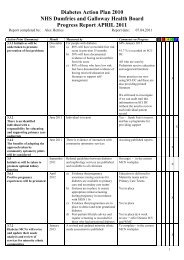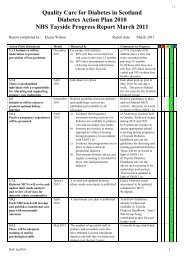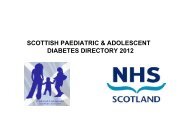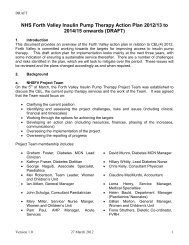DIABETES ACTION PLAN 2010
Diabetes Action Plan 2010 - Scottish Government
Diabetes Action Plan 2010 - Scottish Government
- No tags were found...
Create successful ePaper yourself
Turn your PDF publications into a flip-book with our unique Google optimized e-Paper software.
<strong>DIABETES</strong> <strong>ACTION</strong> <strong>PLAN</strong> <strong>2010</strong><br />
QUALITY CARE FOR <strong>DIABETES</strong> IN SCOTLAND<br />
The diabetes Managed Clinical Networks are responsible for co-ordinating educational<br />
and training initiatives for staff to ensure professionals are equipped to deliver the range of<br />
clinical services across the Network both in the community and in specialist practice. This<br />
can range from the delivery of highly specialist services such as treatment with continuous<br />
subcutaneous insulin infusion (CSII) to the management of diabetes by non-specialist staff<br />
in care homes. The diabetes Managed Clinical Networks need to strengthen local<br />
infrastructure and co-ordination to ensure that opportunities for professionals are<br />
optimised and match patient need. This should include training in working cross-culturally.<br />
As partners in the care of people with diabetes, clinicians will have the active listening skills<br />
and abilities needed to ensure that care and the implementation of guidance such as<br />
SIGN Guideline 116 are designed to support the person living with diabetes. The<br />
Consultation and Relational Empathy (CARE) measure which is being developed as an<br />
integral part of the Quality Strategy assesses how empathetic and person-centred a<br />
clinician’s consultation has been, by asking people to answer ten simple questions. It uses<br />
people’s own words to highlight areas where improvement is needed to drive up the<br />
quality of communication in healthcare. When people understand each other, care<br />
becomes safer and more effective.<br />
Actions we will take:<br />
1. Each diabetes Managed Clinical Network will identify an individual<br />
with responsibility for coordinating diabetes education. They will:<br />
• Review the specific diabetes learning needs of staff.<br />
• Promote educational initiatives to suit all staff across primary and secondary care.<br />
• Compile a database of staff training, linking to the long term conditions education<br />
database maintained by NES.<br />
• Ensure training programmes recognise the differences between different cultural<br />
and social groups.<br />
2. The SDG and the diabetes MCNs will consider how to share best<br />
practice, such as the CARE measure, in delivering person-centred<br />
consultations. This should link to the wider long term conditions<br />
environment to consider the spread and sustainability of best practice.<br />
3. The SDG through the Diabetes Education Advisory Group will<br />
ensure that healthcare professionals have access to the training and<br />
support required to deliver high quality patient-centred care.<br />
Healthcare Quality Dimension: safe; effective<br />
53


